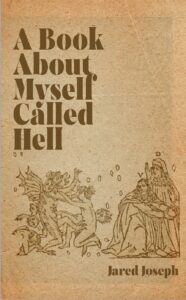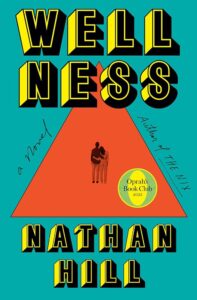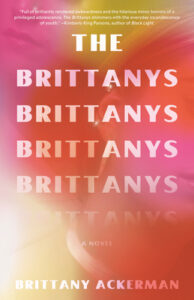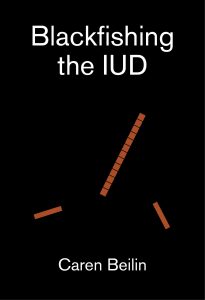Hybrid. 141 pgs. Kerpunkt Press. February 2022. 9781734306545.
 Jared Joseph’s A Book About Myself Called Hell is a book about Dante’s Inferno, the first cantica of the 14th-century epic poem Divine Comedy. While Joseph’s hell is often hilarious in its unfaithful dilation of Dante’s infamous tour of the underworld, Joseph’s humor is no joke. A Book About Myself Called Hell is also a book about late-stage capitalism called It Came from Hell!, and a book about the covid-19 pandemic called Hell, the Reckoning, and a book about writing called Return to Hell. Suffering is no laughing matter except when it is, when the only agency we have is to shape the narrative of our own debasement. True to its medieval roots, this comedy is “a genre where everything begins uncomfortably and ends commodiously” (12).
Jared Joseph’s A Book About Myself Called Hell is a book about Dante’s Inferno, the first cantica of the 14th-century epic poem Divine Comedy. While Joseph’s hell is often hilarious in its unfaithful dilation of Dante’s infamous tour of the underworld, Joseph’s humor is no joke. A Book About Myself Called Hell is also a book about late-stage capitalism called It Came from Hell!, and a book about the covid-19 pandemic called Hell, the Reckoning, and a book about writing called Return to Hell. Suffering is no laughing matter except when it is, when the only agency we have is to shape the narrative of our own debasement. True to its medieval roots, this comedy is “a genre where everything begins uncomfortably and ends commodiously” (12).
A Book About Myself is also a book about myself, or yourself, or a collective enunciation of modular subjectivities abject in their terminal desire to know and be truly known, to love and be truly loved, to deliver and be truly delivered across the gap of Self and Other. Like Dante, Joseph is and is not his own protagonist: “i write only my whole life, even if i lie about my whole life” (60). Like Joseph, his reader is a product of language damned to experience significant others and significant otherness (Achilles and Paris, Mighty Max and Bea, a blind man and the eye of his memory) forever mediated by modes of signification. “Semiosis” sounds like a virus and operates by contagion in Joseph’s text to the perverse pleasure of his reader.
As reader, I’m asked to consider that in Arabic, the word for hair and poem is the same (“beauty, let down your long poem, etc.”), but I do not know this Arabic word, or its length, or anything about makeshift escapes or trapdoors through meaning, and I end up thinking about a mashup of Johnny Cash and Frodo (45). I’m asked to consider Hercules clubbing a centaur and end up thinking about a Marxist critique of the commodity object embodied by Holden Caulfield (the object, not the critique) (85). I’m asked to consider Dante weeping out his own asshole but end up thinking about Dirty Dancing (71). When Dante accidentally curbstomps a frozen head and the head takes offense on behalf of its mother’s resemblance, I’m given a blank page. Then I’m asked to consider the narrator’s mother with a t-cell count of 0 (102-5).
I cannot not consign myself to such associative systems of signs like they’re my Virgil, snaking through discomfort, surprise, grief, beauty (even in the pit of hell itself). In Kant’s regime of autonomy, freedom has a price: when I do what I want, I domesticate myself within my deepest pathologies. True autonomy is doing what I simply can’t not do. In theory, then, the pandemic was the freest I have ever been. I could not not binge-watch SVU, eat Kraft mac and cheese, drunk-call estranged friends, hook up with my ex. I could not not desire my own repression. What? I Kant even. But A Book About Myself tries, and is the record of its trying, its trials, even and especially as it experiences a slow-motion existential crisis.
Joseph’s reading of a reading of a visual metonymy called hell, that is really just bare life, constitutes a double contingency that either jettisons us out of the symbolic order and into the Real, or reinscribes us hopelessly within it. And it is here, in the shadow of dialectical materialism, that there be monsters. “Desire is hell–heaven simply means a universe without desire,” Žižek writes. “‘Hell’ is not another reality full of horrors, ‘hell’ is […] the reality of our lives structured by the inconsistency of our desires, the reality in which we desire what we don’t want and do not even know what we desire.” I don’t want to watch Žižek eating hotdogs from each hand while walking down a city street, his crewneck T-shirt and humped neck, but I desire to youtube it at least monthly. I just did. It’s called “Zizek Devours Into Hotdogs.” And this seems apropos, some living critique of capitalist ideology in which we become what we consume, or what consumes us, and love it. I do not know what I desire. All I know is that I love processed meat, and Žižek, and I find both repulsive. I feel like Dante feels about the bloody stumps of souls flung by Minos into the forested second circle to be scavenged by Harpies. All I know is that when I’m going through hell, books like Joseph’s guide me on and deliver me out.
In “A Letter from a Region in My Mind,” James Baldwin writes of his coming-of-age into the violence of race relations that “I became, during my fourteenth year, for the first time in my life, afraid—afraid of the evil within me and afraid of the evil without.” The pop cultural wheelhouse of Joseph’s book situates him, like myself, in adolescence from Air Bud to earbuds, fourteen and waiting for the ball to drop on the year 2000. The reiterative trauma of the millennium impulse is to anticipate progressive malapropisms like “virtuous cops,” “accessible healthcare,” and “flying cars,” but accept in their stead deepest night, weeping, and gnashing of teeth. Patience, turns out, is not a virtue; you can’t ask agitprop to prom with a boombox. Agitprop does not want to promenade, it wants to set shit ablaze. There are over 101 direct references (I stopped counting) to fire in Joseph’s book, and I appreciate this bounty because hell yes, I am angry. And afraid. But, like Dante, I’m not dead; I’m alive to the best of my ability and as near to the setting of the Jetsons as to the social uprisings of the 1960s. Joseph’s document is a monument to rage against unpardonable stasis, another machine.
I write this in the gloaming of midwinter, punishing myself for the exigency of time with blue light and Flamin’ Hot Cheetos and rubberneck videos on the one year anniversary of the storming of the U.S. Capitol Building by rightwing vigilantes responding to former President Trump’s fabricated claims of election fraud. “We fight like hell, and if you don’t fight like hell, you’re not going to have a country anymore,” a Trump the size of a celluloid Kewpie doll alleges from the corner of my screen. As his “Save America” supporters march on Congress and overspill the Great Rotunda, what circle of hell is this? Who will be saved in abolitionist search histories, and who will be doomed to repetition?
Concluding Joseph’s Cantos is a CliffNotes-esque multiple choice section as if this study/guide has led you to a sublime precipice unbalanced by all the awesome terror of unknowing–of a brooding sea or pop quiz. The correct answer to “What is Lethe?” is “D. I forget” (126). Fitting, given that Lethe is a river in Hades that, when drunk (or drunk from), makes wretched souls forget their (probably wretched) mortal lives. “[N]o deja vu in hell really, all of it is Lethe,” Joseph writes, “but you cannot not step in the same river twice, because you never remember having stepped inside it even once” (52). This mutation of idioms strikes me keenly as a portrayal of pandemic time, concentric and inescapable, not least because of the passage’s proximity to Canto XVII, which begins with a description of me, or who could be me, and Joseph, or who could be Dante, drinking on the abandoned lifeguard tower, pissing in the sand (59). “I forget.” The explication of the correct answer, printed upside down in small font at the bottom of the page (you are falling now), is a quote from Patrik Ourednik’s Europeana: A Brief History of the Twentieth Century, itself a reference to the thesis that would become Francis Fukuyama’s The End of History and the Last Man:
And in 1989, an American political scientist invented a theory about the end of history, according to which history had actually come to an end, because modern science and new means of communication allowed people to live in prosperity, and universal prosperity was the guarantee of democracy and not the contrary […]. But lots of people did not know the theory and continued to make history as if nothing had happened. (126)
A Book About Myself is an impossible book about the impossible task of narrating site-un-specific loss after the end of history when citizen and consumer, liberation and finance, have become synonymous, and when even synonyms disappeared in a global tragedy without likeness. Yet Joseph’s book exists, and far from an Adornean barbarity that seeks to represent, A Book About Myself seeks to unknow with such incendiary vulnerability that any last residue, a me or a Joseph or a Dante, can forget themself and be recast by what hell really is: that which “makes the world yearn, which means burn, too” (122).
The cover of Srikanth Reddy’s Voyager, another book I love, depicts burning maps, perhaps maps of Italy. “The Inferno not only constructs Hell,” Joseph reminds us, “it constructs a launching pad that thrusts Italy out of the medieval era and into the nation-based paradigm that characterizes our own western modernity, or hell” (14). Reddy’s Voyager manages to rewrite, through erasure and with mention of Dante, the autobiography of Kurt Waldheim—a former lieutenant officer in Hitler’s Wehrmacht, the President of Austria, and UN Secretary General, as well as a current greeting on the Voyager Golden Records—into a meditation on what we need most: not another atrocity of power, not power in any form, but the suffering intimacy that persists in its ashes. No, persists against power as its dialectical Other? “The road to hell is paved with transubstantiation. May the muse inspire me to substantiate this claim” (111).
Q: What stays in the past?
A: LOL
I feel indeed like Bernadette Mayer in Midwinter Day, yet another book I love: “I thought I was going to write/A story of my theories tonight/Not this desirous essay on art and home,/This alarming dictionary of reformist love.” Despite tactical and prosaic affinities between Reddy, Mayer, and Joseph, what I think I’m trying to say is that these works share a mouthfeel, and it feels like burning and it feels like yearning, too. If heaven is only as good as hell sans desire, I don’t wanna go. If this is torture, chain me to the wall.
A Book About Myself Called Hell is available through Kerpunkt Press. Purchase it now through their website.
Like what you’re reading?
Get new stories or poetry sent to your inbox. Drop your email below to start >>>
OR grab a print issue
Stories, poems and essays in a beautifully designed magazine you can hold in your hands.
GO TO ISSUESNEW book release
Ghosts Caught on Film by Barrett Bowlin. Order the book of which Dan Chaon calls “a thrilling first collection that marks a beginning for a major talent.”
GET THE BOOK


